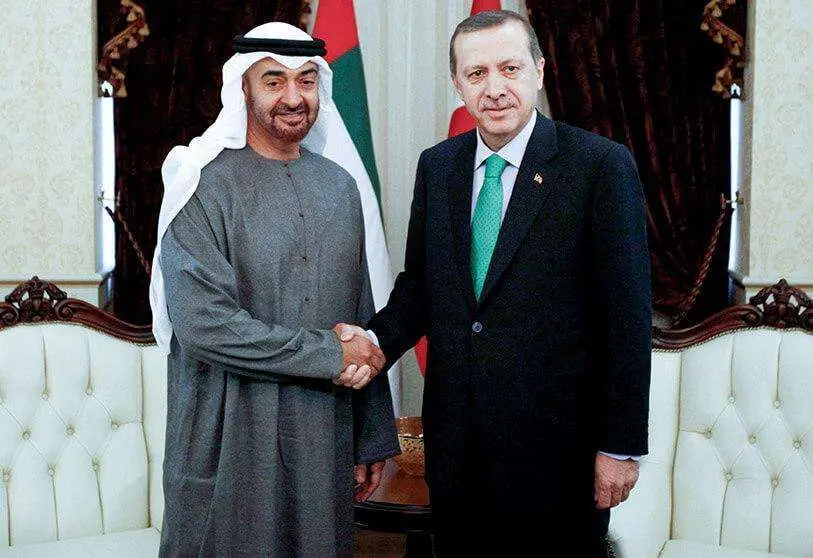Ankara and Abu Dhabi continue to advance their economic rapprochement

After almost a decade of strained relations between Abu Dhabi and Ankara, moves by both powers in recent months appear to be revitalising trade and diplomatic ties. This was evidenced by the first face-to-face meeting between Mohammed bin Zayed Al-Nahyan, crown prince of the emirate of Abu Dhabi and 'de facto' ruler of the territory, and Recep Tayyip Erdogan, president of Turkey, last November. It was one of the highest-level visits between the two long-standing Middle Eastern rivals in years.
In light of this rapprochement and as agreed in consecutive meetings, the UAE has reaffirmed its interest in economic and commercial openness towards the Ottoman country, and maintains that the long-term investments it hopes to make in Turkey are unrelated to its president, Tayyip Erdogan. Along these lines, Thani Al Zeyoudi, the Emirati Minister of State for Foreign Trade, declared in an interview for Bloomberg Television his "commitment to Turkey as a country that will open up new markets for us through logistics and its supply chain".
According to a number of experts and economists, the UAE's strategy pursues regional and international positioning and aims to increase the country's economic clout and investment opportunities. To this end, its promising rapprochement with Ankara could allow it to take advantage of Turkish trade links and logistical facilities with the rest of the world. Especially with the African continent.
Moreover, Turkey's complicated situation - increasingly mired in economic and social imbalance, with a deeply devalued currency and an inflation rate of over 20 per cent - has intensified its need for foreign investment. Abu Dhabi Deveolpment Holding (ADQ) chief executive Mohammed Hassan Al-Suwaidi told the Financial Times that the falling lira is a factor that makes this "a good time" to invest in the country if it is done with a "long-term view".

Predictions about the Turkish situation have been dimming as the end of 2021 approached, but this injection of Emirati capital into local companies and improved trade relations could partially reverse these predictions. The decision by ADQ - Abu Dhabi's state-owned investment vehicle - to bet on the Ottoman economy has led to a hunt for investment opportunities, from financial institutions to logistics and food companies.
However, Abu Dhabi has clarified that these initiatives, which do seek returns and profits, are unrelated to the funds to stimulate the Turkish economy agreed with Erdogan in November. The Emirati investment package of around $10 billion was intended to 'enhance support for the Turkish economy and strengthen cooperation between the two countries', but was not part of a meticulous strategic diplomatic and financial planning. Thus, the plan focused on the technology and energy sectors, but also included banking, logistics, port and infrastructure cooperation agreements between ADQ and the Turkish Wealth Fund (TWF), the Turkish Presidency Investment Office and several local companies.
Since it began its financial activities three years ago, Abu Dhabi Deveolpment Holding - chaired by UAE national security adviser Sheikh Tahnoon bin Zayed al-Nahyan - has become one of the largest investment companies in the region. ADQ currently mobilises assets of between $110 billion and $120 billion, and continues a massive investment drive in key sectors of the UAE economy.

While this rapprochement raises hopes for the Turkish economy, improved trade, diplomatic and political relations between the two powers are not just good news for Ankara.
For the past few years, the UAE has been pursuing so-called 'economic diplomacy', as - in direct regional competition with the giant Saudi Arabia - Abu Dhabi seeks to consolidate its position as a global centre for business and finance. In 2021 the country announced its intention to strengthen trade ties with the fast-growing economic powers of the Asian and African continents, and the Emirati authorities are currently also in talks with Israel and India.

However, Turkey's gains are considerably greater. After a decade of foreign relations based on isolation and non-cooperation with neighbouring states (2002-2013), Ankara must now place national security and normalisation of relations at the top of its political agenda. Problems stemming from the lack of allies, the economic crisis, sanctions and the devaluation of the lira require Erdogan to change his diplomatic posture. He has been doing so in recent months, and in addition to reaching out to the United Arab Emirates, he has begun to work on ties with Egypt and Armenia.








